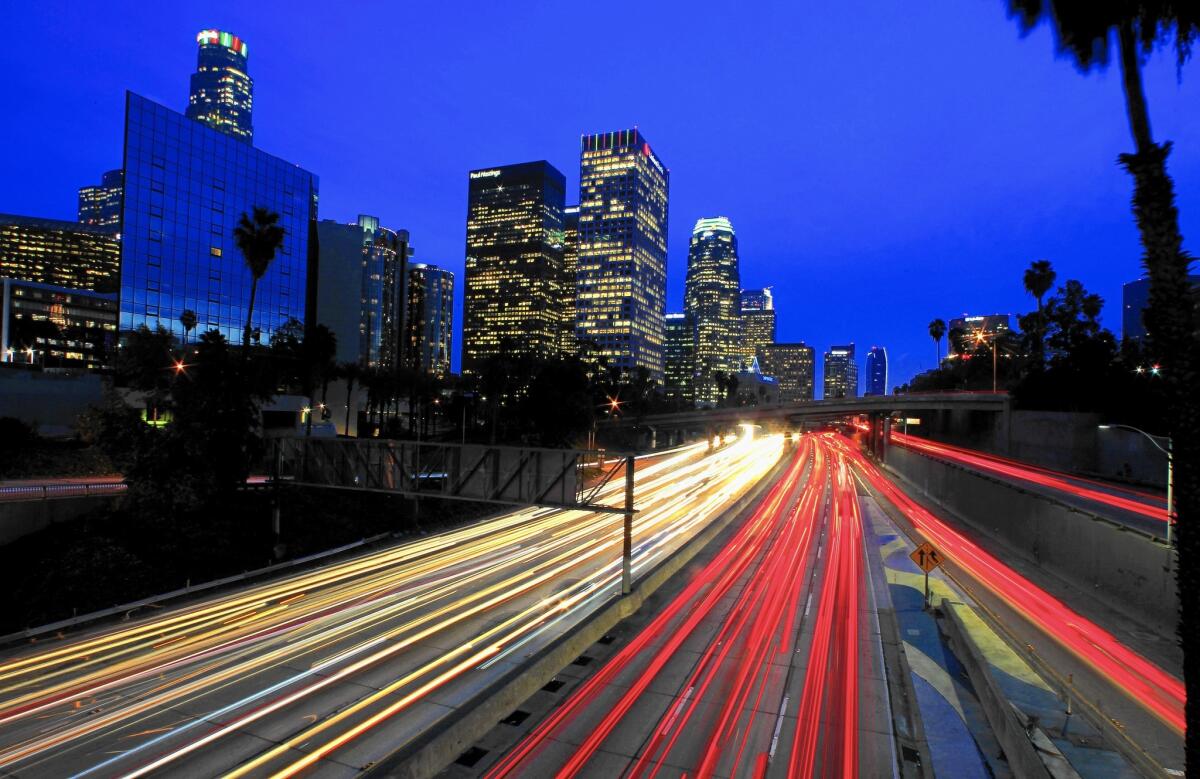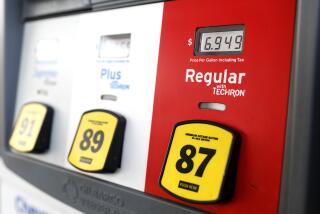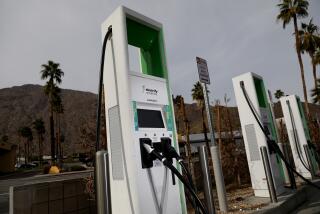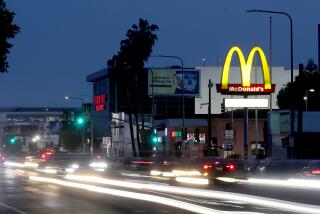Tracking miles as gas tax alternative raises fairness, privacy concerns

Standing at a Chevron station in Long Beach, Teresa Gutierrez wished she was pumping fuel into a gas-sipping hybrid instead of her hulking GMC Yukon.
She was nevertheless cool to the idea that the state might start raising money for highway repairs by replacing the traditional gasoline tax with a fee based on how far people drive. Penalizing owners of hybrids and electric cars doesn’t feel right, Gutierrez said. “It defeats their green purpose.”
Jesus Velez also objected as he filled the 28-gallon tank of his Lincoln Navigator. Then he realized that owners of higher-mileage cars buy far less fuel, and therefore pay far less in gas taxes. A per-mile fee “would make it fairer for everyone,” he concluded.
Faced with growing shortfalls in highway funding as drivers give up their gas-guzzling cars, California officials are trying to determine if a mileage fee would be more effective at raising revenue for road projects than the state tax of 36 cents per gallon.
The mileage-based concept, which nine other states are considering, received strong support in October when Gov. Jerry Brown approved a pilot program to test the idea using a sample of motorists.
The fee structure probably would depend on what officials think drivers would accept: It could be low enough to generate only what the gas tax brings in, or it could it be set higher to catch up on a backlog of maintenance and repairs.
Beyond the dollar amount, a mileage-based system raises fairness and privacy questions.
In 2012, the U.S. Senate killed a $90-million pilot project that would have involved 10,000 cars. Rural lawmakers contended that mileage fees were unfair to their constituents, who lived far from cities or their places of work.
“There are a lot of issues that need to be looked at and explored,” said Steve Finnegan, government affairs manager for the Automobile Club of Southern California. “Two things are paramount — the fees must be fair and appropriate, and their use must benefit those who are paying them.”
Millions of vehicles also would have to be equipped with odometer readers, smartphone applications or global positioning technology that would transmit data to state officials or a contractor, who would then bill owners for the miles traveled.
Privacy advocates are especially concerned that — in this era of data mining and well-publicized credit card breaches — the technology could be used to learn not only how far people go, but when and where.
Already, a test involving 50 motorists in Nevada raised concerns that the recording devices could be changed to track more than total mileage.
No one disputes, however, the urgent need to raise money for freeway maintenance, rehabilitation and operations in California. All are paid for out of the gas tax, which has not been adjusted for inflation in 20 years, though the cost of highway work has swelled.
“We are on the brink of a fiscal cliff in transportation funding,” said state Sen. Mark DeSaulnier (D-Concord), author of the bill Brown signed calling for the pilot program. “We need to look at alternatives.”
DeSaulnier noted that major sources of federal highway funds are drying up and that gasoline sales are plummeting as Californians drive less and fuel economy improves.
In 2004, the difference between needed and actual funding for road repairs was about $1 billion, according to Caltrans. By 2014, the gap had grown to about $6.2 billion.
Unless new revenue streams are found, transportation experts have warned, California’s highways will become increasingly congested and fall further into disrepair — causing costly delays for travelers and the shipment of goods. That could reduce the economic competitiveness of California, one of the nation’s main gateways for imports and exports.
“There are no other options to fund our transportation systems unless we go to a user fee,” said Hasan Ikhrata, executive director of the Southern California Assn. of Governments, a regional planning agency that has considered alternatives to the gas tax for 25 years. “The federal and state governments will have to get out of the transportation business if they cannot find a way to make the funding stream whole.”
If the state’s pilot program is successful, the mileage fee could replace the gas tax in early 2017 under provisions of DeSaulnier’s bill. Supporters of the concept know it would cost more to administer than the current gas tax, but the real trick would be setting rates that are fair to all.
A 5,000-driver demonstration project planned in Oregon next year will have a per-mile fee of 1.5 cents. To avoid some of the potential pitfalls, vehicle owners will be able to choose how their mileage is recorded and whether the state or a contractor administers their accounts.
Officials say travel on private roads or out of state will not be counted. And to accommodate civil-liberties groups, Oregon will track only the total distance driven — data that will be destroyed 30 days after payments are made. Motorists in the trial will pay the mileage fee and receive a refund of the Oregon gas tax, because pumps across the state cannot be reset to exclude the charge when they buy fuel.
In California, motorists who travel 12,000 miles annually pay about $184 in gas taxes if their vehicles deliver the national average of 23.5 miles per gallon.
If the state followed Oregon’s lead and charged 1.5 cents a mile, the cost to average drivers would be about $180.Assuming the hypothetical mileage fee were boosted to 2 cents, the cost to a typical driver would rise to $240 a year.
At the Howard Jarvis Taxpayers Assn., president Jon Coupal said the organization has no position on mileage-based fees. But the devil can be in the details, he added.
“User pay makes sense,” Coupal said. “Our concern is that we might end up with another level of taxation and the mileage fee does not supplant the [state] excise tax.”
Truckers in other states have questioned whether such fees would be fair due to the long distances they travel. The California Trucking Assn. also has no formal position, except to say that haulers might object if they had to deal with differing fees from state to state or region or region.
Among those who would be hardest hit by a mileage fee are owners of hybrids and electric cars, such as Jason Fundenberg, president of the Los Angeles Tesla Owners Club. He questioned whether the state can protect drivers’ privacy and calculate an equitable fee.
“I don’t think people mind paying their fair share, if it is a fair share,” said Fundenberg, who owns two Teslas. “What about vehicle weight? Miles driven? Environmental impact and a smaller energy footprint? There needs to be a fair assessment.”
Cheryl Downey said that to reduce her exhaust emissions and energy footprint, two of her last three cars have been hybrids. The Long Beach resident estimated that her current vehicle, a Chevrolet Volt, has saved her more than 800 gallons and about $300 in gas taxes in two years.
Still, she said, the mileage fee is long overdue. “We use the roads and cross the bridges, but we are not paying our fair share. With protections on privacy, I am OK with it. I want good roads like any other driver.”
dan.weikel@latimes.com
Twitter: @LADeadline16
More to Read
Start your day right
Sign up for Essential California for news, features and recommendations from the L.A. Times and beyond in your inbox six days a week.
You may occasionally receive promotional content from the Los Angeles Times.







